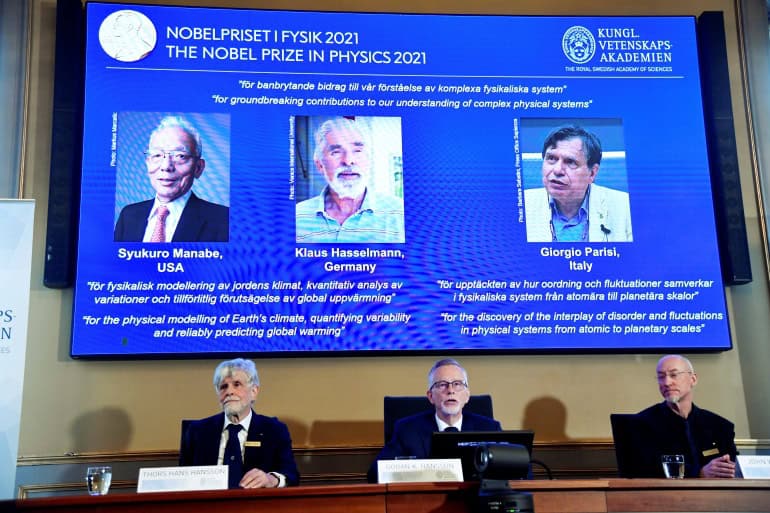Three Laureates from Japan, Germany and Italy Tuesday won the 2021 Nobel Prize for groundbreaking contributions to our understanding of complex physical systems.
Japanese-born American Syukuro Manabe, German Klaus Hasselmann and Italian Giorgio Parisi have been bestowed with the prestigious award in the Physics category.
“Syukuro Manabe and Klaus Hasselmann laid the foundation of our knowledge of the Earth’s climate and how humanity influences it. Giorgio Parisi is rewarded for his revolutionary contributions to the theory of disordered materials and random processes,” the Royal Swedish Academy of Sciences said.
WATCH LIVE: Join us for the 2021 Nobel Prize in Physics announcement.
Hear the breaking news first – see the live coverage from 11:45 CEST.
Where are you watching from? #NobelPrize https://t.co/nfDkBpLYcJ
— The Nobel Prize (@NobelPrize) October 5, 2021
The three experts will split the 10 million Swedish kronor (roughly $1.1 million) for this year’s prize. One half of total prize money will be distributed in equal parts between Manabe, 90, and Hasselmann, 89, for modelling earth’s climate and reliably predicting global warming.
The other half will go to Giorgio Parisi for discovering hidden patterns in disordered complex materials in 1980.
One complex system of vital importance to humankind is Earth’s climate. Syukuro Manabe demonstrated how increased levels of carbon dioxide in the atmosphere lead to increased temperatures at the surface of the Earth. In the 1960s, he led the development of physical models of the Earth’s climate and was the first person to explore the interaction between radiation balance and the vertical transport of air masses. His work laid the foundation for the development of current climate models.
"I never thought I would receive the Nobel Prize in Physics!"
Take a listen to our conversation with our new physics laureate Syukuro Manabe who was shocked and happy after hearing about his #NobelPrize earlier today. pic.twitter.com/KGtoWoUXbX
— The Nobel Prize (@NobelPrize) October 5, 2021
About ten years later, Klaus Hasselmann created a model that links together weather and climate, thus answering the question of why climate models can be reliable despite weather being changeable and chaotic. He also developed methods for identifying specific signals, fingerprints, that both natural phenomena and human activities imprint in he climate. His methods have been used to prove that the increased temperature in the atmosphere is due to human emissions of carbon dioxide.
"We've been warning against climate change for about 50 years or so."
We spoke to new laureate Klaus Hasselmann just minutes after the announcement of his #NobelPrize in Physics.
Take a listen: pic.twitter.com/nftL0qjz1z
— The Nobel Prize (@NobelPrize) October 5, 2021
Around 1980, Giorgio Parisi discovered hidden patterns in disordered complex materials. His discoveries are among the most important contributions to the theory of complex systems. They make it possible to understand and describe many different and apparently entirely random materials and phenomena, not only in physics but also in other, very different areas, such as mathematics, biology, neuroscience and machine learning.
“The discoveries being recognised this year demonstrate that our knowledge about the climate rests on a solid scientific foundation, based on a rigorous analysis of observations. This year’s Laureates have all contributed to us gaining deeper insight into the properties and evolution of complex physical systems,” says Thors Hans Hansson, chair of the Nobel Committee for Physics.
https://en.dailypakistan.com.pk/05-Oct-2021/raw-s-attempt-to-malign-pakistan-army-officers-says-gen-r-shafaat-after-being-named-in-pandora-papers













